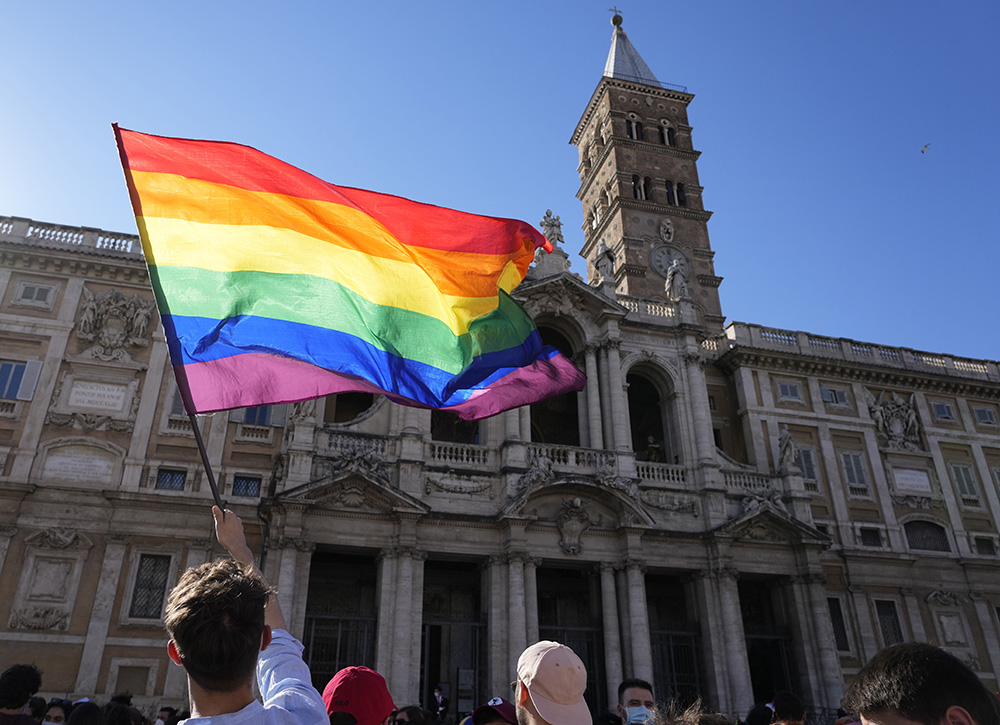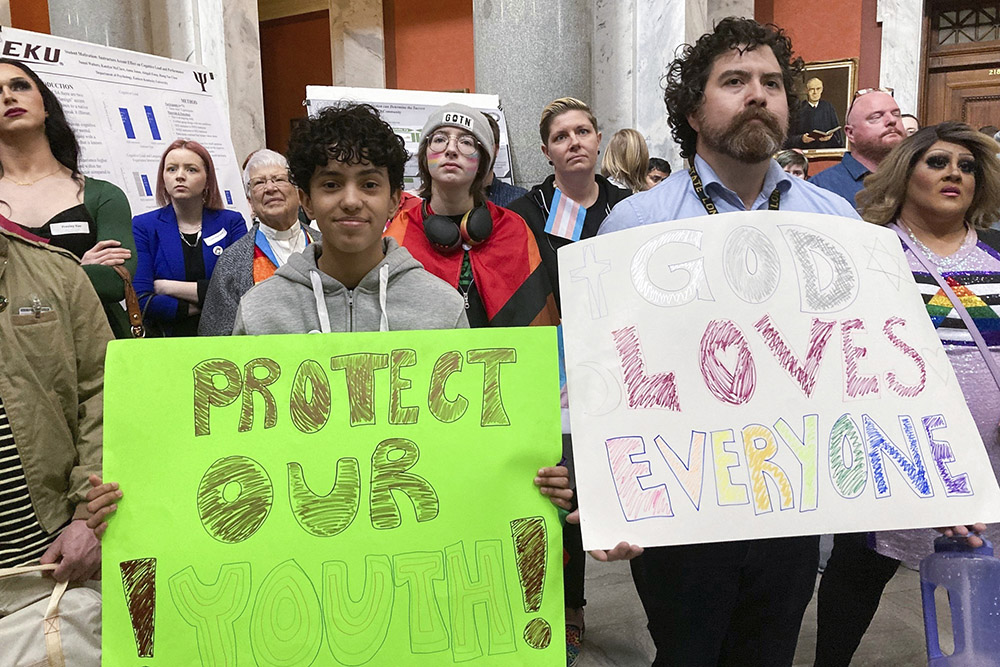
A demonstrator waves a rainbow flag in front of the Basilica of St. Mary Major during the annual Pride march in Rome June 26, 2021. (AP/Gregorio Borgia)
Pope Francis has recently expressed support for the decriminalization of homosexuality, urging bishops worldwide to undergo a "conversion" toward the LGBTQ+ community. While the change in tone is a step forward for LGBTQ+ Catholics, the Catholic Church's teachings on homosexuality and gender identity still need revision to repair the harm inflicted on queer people. The hierarchy, including Francis, needs to recognize its own fallibility and embrace conversion by acknowledging the signs of the times, prompted by the Holy Spirit.
During his pontificate, Francis has emphasized mercy, social justice and inclusion as values driving the church's mission, moving beyond an obsession with doctrinal fidelity and culture wars. He has made outreach to LGBTQ+ people a hallmark of his papacy, emphasizing welcoming queer people into the church and encouraging nonjudgment and inclusion.
Despite these positive developments, Francis has never proposed a review of the church's teachings on homosexuality in light of scientific or psychological evidence.
Catholic doctrine holds that a homosexual orientation is not sinful, but the institutional church maintains that acting upon same-sex attractions is "intrinsically disordered." The Catechism of the Catholic Church describes heterosexual marriage open to procreation as the only legitimate and healthy expression of human sexuality, recommending chastity as the viable path to holiness for LGBTQ+ people.
The catechism also fails to acknowledge the reality of transgender people, reflecting a tendency within Christianity to negate trans existence as a threat to heterosexual marriage.

Transgender-rights advocates gather near the Kentucky House chamber in Frankfort March 2. (AP/Bruce Schreiner, File)
While Francis has personally welcomed trans people on a pastoral level, he has vocally condemned what he perceives to be "gender ideology," describing teaching about gender identity in schools as "ideological colonization."
On March 20, the U.S. bishops waded into nationwide right-wing attempts to further marginalize trans people by releasing a document titled, "A Doctrinal Note on the Moral Limits to Technological Manipulation of the Human Body," condemning gender-affirming medical care, stating, "Any technological intervention that does not accord with the fundamental order of the human person as a unity of body and soul, including the sexual difference inscribed in the body, ultimately does not help but, rather, harms the human person."
Science and psychology confirm that homosexuality is an innate aspect of the human experience. Recent studies have described sexual attraction to persons of the same sex as "a natural part of our diversity as a species."
A 2019 Science study refutes the notion of a so-called "gay gene" by concluding that multiple genetic components factor into the development of sexual identity, in addition to social and environmental elements. Researchers emphasize that one's orientation cannot be described as a voluntary or conscious choice, even when taking environmental factors into consideration.
"Just because something is not completely genetic or something has an environmental, or what we call nongenetic, component doesn't mean it's a choice," according to J. Fah Sathirapongsasuti, a computational biologist and co-author of the Science study.
The American Psychological Association removed homosexuality from its list of mental disorders in 1973 and the World Health Organization (WHO) followed suit on May 17, 1990 — a date now commemorated by the United Nations as the International Day Against Homophobia, Transphobia and Biphobia. Although fairly recent, the WHO removed being transgender from its compilation of mental illnesses in 2019.
The Catholic Church must leave behind its dehumanizing teachings on gender identity and sexual orientation to fully heal the multilayered forms of trauma it imposes on queer people.
Contemporary biblical scholarship demonstrates that scriptural references to homosexuality do not reflect modern scientific understandings of sexual orientation. Numerous Christian denominations have expanded their scriptural interpretations to affirm, welcome and celebrate LGBTQ+ members of faith, including the Episcopal Church, the Evangelical Lutheran Church in America, the United Church of Christ, the Metropolitan Community Church and the Presbyterian Church (USA) — without preconditions of chastity.
Such revelations amplify the overdue necessity for the Catholic Church to repair the debilitating harm it inflicts against queer people and revise its teaching that being gay is "intrinsically disordered," as well as acknowledge the reality of gender identity.
Doing so would attest to the numerous instances Catholic doctrine has evolved and changed over time — such as when Vatican II embraced religious liberty (contrasting its 19th-century condemnations of "modernism"), affirmed the holiness of non-Christian religions, acknowledged that Christ's church existed outside of Catholicism, reversed Galileo's condemnation by the Inquisition for asserting that Earth was not the center of the universe, or when Francis himself revised the catechism in 2018 to declare the death penalty incompatible with Catholic teaching.
While tonal changes are inspiring, the root of the Catholic Church's harmful ideology against LGBTQ+ people lies in a misguided theology that perpetuates spiritual, emotional, psychological, physical and sexual oppression. The church must leave behind its dehumanizing teachings on gender identity and sexual orientation to fully heal the multilayered forms of trauma it imposes on queer people.
My late mother, a Black woman who lived through desegregation, was one of my biggest supporters. When I resigned myself to celibacy, her constant refrain was, 'But would you really be happy?'
Even members of the hierarchy have begun to express how degrading the institutional church's teachings are to queer people. Cardinal Robert McElroy, bishop of San Diego, has called for the "radical inclusion" of LGBTQ+ people in the church, in a powerful America magazine piece.
"It is a demonic mystery of the human soul why so many men and women have a profound and visceral animus toward members of the L.G.B.T. communities," McElroy wrote. "The church's primary witness in the face of this bigotry must be one of embrace rather than distance or condemnation."
In America's "Jesuitical" podcast, the cardinal goes on to advocate for removing the term "intrinsically disordered" from the catechism. "The intrinsically disordered language is a disservice," the cardinal said. "The problem is, it's used in the catechism as a philosophical term, but to us in our country and really most of the world, disorder is thought of as psychological. It's a terrible word and it should be taken out of the catechism."
McElroy hopes the ongoing synod on synodality will encourage prelates to embrace queer Catholics without making LGBTQ+ inclusion contingent on celibacy.
The catechism's language on homosexuality inflicted a deep wound on my psyche for most of my adolescence. Navigating my own journey of conscience as a gay Catholic involved accepting that biblical references to homosexuality were limited by the historical, social and cultural context in which they were written. These passages could never reflect the sacred truth of being attracted to another man, in mind, body and spirit. Gradually, I came to embrace my gay identity as a divine gift.
Advertisement
My late mother, a Black woman who lived through desegregation, was one of my biggest supporters. When I resigned myself to celibacy, her constant refrain was, "But would you really be happy?"
Baltimore's Jesuit parish, St. Ignatius Church, has served as my spiritual home for the past decade and I remain grateful to be part of such an unconditionally affirming Catholic community.
The first Jesuit pope has made fulfilling the Second Vatican Council a central theme of his pontificate. However, embracing Vatican II's innovative spirit entails reading the "signs of the times," as called for by Gaudium et Spes ("Joy and Hope"), one of the council's defining texts reformulating the church's relationship with the modern world.
Francis lacks moral courage in denouncing homosexuality as a crime but refusing to confront Catholic doctrines that fuel homophobia and transphobia throughout the world. As global social movements wage revolutionary struggles for Black liberation, abolition, women's rights and transcending capitalist exploitation, the bishop of Rome should be enthusiastically joining the struggle for queer liberation — affirming sexuality and gender identity as divine gifts.
Francis has issued soaring pontifications about a more inclusive church for the past decade. But our times demand that prophetic shepherds zealously walk the walk in advancing Christ's animating purpose on Earth, described by John's Gospel: "I came that they might have life, and have it abundantly" (John 10:10).







